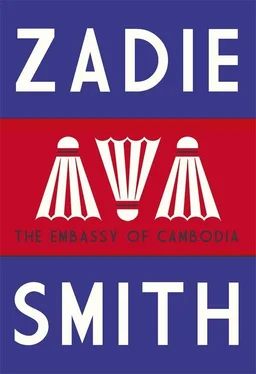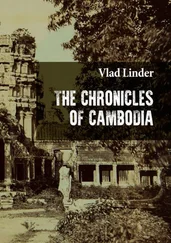There is a house with a huge pink elephant on the doorstep, apparently made of mosaic tiles.
There is a Catholic nunnery with a single red Ford Focus parked in front. There is a Sikh institute. There is a faux-Tudor house with a pool that Mickey Rooney rented for a season, while he was performing in the West End fifteen summers ago. That house sits opposite a dingy retirement home, where one sometimes sees distressed souls, barely covered by their dressing gowns, standing on their tiny balconies, staring into the tops of the chestnut trees.
So we are hardly strangers to curious buildings, here in Willesden and Brondesbury. And yet still we find the Embassy of Cambodia a little surprising. It is not the right sort of surprise, somehow.
In a discarded Metro found on the floor of the Derawal kitchen, Fatou read with interest a story about a Sudanese ‘slave’ living in a rich man’s house in London. It was not the first time that Fatou had wondered if she herself was a slave, but this story, brief as it was, confirmed in her own mind that she was not. After all, it was her father, and not a kidnapper, who had taken her from Ivory Coast to Ghana, and when they reached Accra they had both found employment in the same hotel. Two years later, when she was eighteen, it was her father again who had organized her difficult passage to Libya and then on to Italy — a not insignificant financial sacrifice on his part. Also, Fatou could read English — and speak a little Italian — and this girl in the paper could not read or speak anything except the language of her tribe. And nobody beat Fatou, although Mrs Derawal had twice slapped her in the face, and the two older children spoke to her with no respect at all and thanked her for nothing. (Sometimes she heard her name used as a term of abuse between them. ‘You’re as black as Fatou.’ Or ‘You’re as stupid as Fatou.’) On the other hand, just like the girl in the newspaper, she had not seen her passport with her own eyes since she arrived at the Derawals’, and she had been told from the start that her wages were to be retained by the Derawals to pay for the food and water and heat she would require during her stay, as well as to cover the rent for the room she slept in. In the final analysis, however, Fatou was not confined to the house. She had an Oyster Card, given to her by the Derawals, and was trusted to do the food shopping and other outside tasks, for which she was given cash and told to return with change and receipts for everything. If she did not go out in the evenings that was only because she had no money with which to go out, and anyway knew very few people in London. Whereas the girl in the paper was not allowed to leave her employers’ premises, not ever — she was a prisoner.
On Sunday mornings, for example, Fatou regularly left the house, to meet her church friend Andrew Okonkwo at the 98 bus stop and go with him to worship at the Sacred Heart of Jesus, just off the Kilburn High Road. Afterwards Andrew always took her to a Tunisian café, where they had coffee and cake, which Andrew, who worked as a night guard in the City, always paid for. And on Mondays Fatou swam. In very warm water, and thankful for the semi-darkness in which the health club, for some reason, kept its clientele, as if the place were a nightclub, or a midnight Mass. The darkness helped disguise the fact that her swimming costume was in fact a sturdy black bra and a pair of plain black cotton knickers. No, on balance she did not think she was a slave.
The woman exiting the Embassy of Cambodia did not look especially like a New Person or an Old Person — neither clearly of the city nor the country — and of course it is a long time since this division meant anything in Cambodia. Nor did these terms mean anything to Fatou, who was curious only to catch her first sighting of a possible Cambodian anywhere near the Embassy of Cambodia. She was particularly interested in the woman’s clothes, which were precise and utilitarian — a grey shirt tucked tightly into a pair of tan slacks, a blue mackintosh, a droopy rain hat — just as if she were a man, or no different from a man. Her straight black hair was cut short. She had in her hands many bags from Sainsbury’s, and this Fatou found a little mysterious: where was she taking all that shopping? It also surprised her that the woman from the Embassy of Cambodia should shop in the same Willesden branch of Sainsbury’s where Fatou shopped for the Derawals. She had an idea that Oriental people had their own, secret establishments and shopped there. (She believed the Jews did, too.) She both admired and slightly resented this self-reliance, but had no doubt that it was the secret to holding great power, as a people. For example, when the Chinese had come to Fatou’s village to take over the mine, an abiding local mystery had been: what did they eat and where did they eat it? They certainly did not buy food in the market, or from the Lebanese traders along the main road. They made their own arrangements. (Whether back home or here, the key to surviving as a people, in Fatou’s opinion, was to make your own arrangements.)
But, looking again at the bags the Cambodian woman carried, Fatou wondered whether they weren’t in fact very old bags — hadn’t their design changed? The more she looked at them the more convinced she became that they contained not food but clothes or something else again, the outline of each bag being a little too rounded and smooth. Maybe she was simply taking out the rubbish. Fatou stood at the bus stop and watched until the Cambodian woman reached the corner, crossed and turned left towards the high road. Meanwhile, back at the embassy the badminton continued to be played, though with a little more effort now because of a wayward wind. At one point it seemed to Fatou that the next lob would blow southwards, sending the shuttlecock over the wall to land lightly in her own hands. Instead the other player, with his vicious reliability (Fatou had long ago decided that both players were men), caught the shuttlecock as it began to drift and sent it back to his opponent — another deathly, downward smash.
No doubt there are those who will be critical of the narrow, essentially local scope of Fatou’s interest in the Cambodian woman from the Embassy of Cambodia, but we, the people of Willesden, have some sympathy with her attitude. The fact is if we followed the history of every little country in this world — in its dramatic as well as its quiet times — we would have no space left in which to live our own lives or to apply ourselves to our necessary tasks, never mind indulge in occasional pleasures, like swimming. Surely there is something to be said for drawing a circle around our attention and remaining within that circle. But how large should this circle be?
It was the Sunday after Fatou saw the Cambodian that she decided to put a version of this question to Andrew, as they sat in the Tunisian café eating two large fingers of dough stuffed with cream and custard and topped with a strip of chocolate icing. Specifically, she began a conversation with Andrew about the Holocaust, as Andrew was the only person she had found in London with whom she could have these deep conversations, partly because he was patient and sympathetic to her, but also because he was an educated person, presently studying for a part-time business degree at the College of North West London. With his student card he had been given free, twenty-four-hour access to the Internet.
‘But more people died in Rwanda,’ Fatou argued. ‘And nobody speaks about that! Nobody!’
‘Yes, I think that’s true,’ Andrew conceded, and put the first of four sugars in his coffee. ‘I have to check. But, yes, millions and millions. They hide the true numbers, but you can see them online. There’s always a lot of hiding; it’s the same all over. It’s like this bureaucratic Nigerian government — they are the greatest at numerology, hiding figures, changing them to suit their purposes. I have a name for it: I call it “demonology”. Not “numerology” — “demonology”.’
Читать дальше












